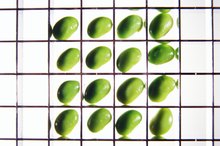Side Effects of Maca on Women
Maca root has been consumed in the Peruvian Andes for more than 2,000 years and is highly valued as a nutrient-rich food and a medicine. Traditional uses include improving sex drive, treating infertility and enhancing overall energy and sense of well-being. While research supports some of its purported uses, not enough evidence exists to draw any firm conclusions. Maca seems generally safe but it might cause some negative effects that for the most part can affect both men and women. Talk to your doctor about the potential risks and benefits of using maca root supplements.
General Safety
Drugs.com reports studies in which animals that consumed large amounts of maca did not appear to suffer any adverse effects, which suggests maca is nontoxic. Its long history of use as a food suggests it probably is generally safe to consume. However, its safety for children or pregnant women has not been thoroughly investigated, according to the NYU Langone Medical Center.
Estrogenic Activity
Which Herbs Are Bad for the Thyroid?
Learn More
The Memorial Sloan Kettering Cancer Center reports maca root possesses estrogenic activity. While it is unclear if this would translate to any real danger, using supplements with estrogenic activity could prove problematic in certain instances, such as suffering from or having an increased risk of breast cancer or other hormone-sensitive diseases. If this applies to you, discuss the potential risks of using maca root in this instance.
Impaired Thyroid Function
Maca contains substances called glucosinolates, which can interfere with production of thyroid hormone -- particularly in the presence of a low-iodine diet – and cause goiter, a swelling of the gland that results in a lump at the base of neck. The University of Michigan Health System reports that while other foods that contain these substances have been shown to impair thyroid function, it has not been proven that maca causes this problem as well, though it is likely it would produce a similar effect. Reduced thyroid function most commonly strikes women over 50, so if you fall into this category and do not know the status of your thyroid function, consider getting tested before using maca.
Other Safety Concerns
Side Effects of Long-Time Usage of Ashwagandha
Learn More
Maca has been touted as a treatment for both male and female infertility, although the NYU Longone Medical Center cautions that it's not yet clear how well it works. If you have an interest in using maca to improve your chances of conception, discuss this with your doctor. This is especially important if you are taking standard fertility drugs, as you want to make sure your doctor does not have concerns about negative interactions that could affect their efficacy. Do not use while pregnant or breastfeeding due to lack of safety data. If you have liver or kidney disease, always clear the use of supplements with your doctor.
- Maca has been touted as a treatment for both male and female infertility, although the NYU Longone Medical Center cautions that it's not yet clear how well it works.
- This is especially important if you are taking standard fertility drugs, as you want to make sure your doctor does not have concerns about negative interactions that could affect their efficacy.
Related Articles
References
- Memorial Sloan Kettering Cancer Center; Maca; May 2011
- NYU Langone Medical Center: Maca
- University of Michigan Health System; Maca;December 2009
- Ley, BM. Maca! Adaptogen and Hormonal Regulator. Minneapolis, MN: BL Publications: 2003.
- Shin BC, Lee MS, Yang EJ, Lim HS, Ernst E. Maca (L. meyenii) for improving sexual function: a systematic review. BMC Complement Altern Med. 2010;10:44. doi:10.1186/1472-6882-10-44
- Gonzales GF, Córdova A, Vega K, et al. Effect of Lepidium meyenii (MACA) on sexual desire and its absent relationship with serum testosterone levels in adult healthy men. Andrologia. 2002;34(6):367-72. doi:10.1046/j.1439-0272.2002.00519.x
- Dording CM, Schettler PJ, Dalton ED, et al. A double-blind placebo-controlled trial of maca root as treatment for antidepressant-induced sexual dysfunction in women. Evid Based Complement Alternat Med. 2015;2015:949036. doi:10.1155/2015/949036
- Melnikovova I, Fait T, Kolarova M, Fernandez EC, Milella L. Effect of Lepidium meyenii Walp. on semen parameters and serum hormone levels in healthy adult men: a double-blind, randomized, placebo-controlled pilot study. Evid Based Complement Alternat Med. 2015;2015:324369. doi:10.1155/2015/324369
- Stojanovska L, Law C, Lai B, et al. Maca reduces blood pressure and depression, in a pilot study in postmenopausal women. Climacteric. 2015;18(1):69-78. doi:10.3109/13697137.2014.929649
- Oshima M, Gu Y, Tsukada S. Effects of Lepidium meyenii Walp and Jatropha macrantha on blood levels of estradiol-17 beta, progesterone, testosterone and the rate of embryo implantation in mice. J Vet Med Sci. 2003;65(10):1145-6. doi:10.1292/jvms.65.1145
- Loria, K. How to choose supplements wisely. Consumer Reports. Updated October 30, 2019.
- Dording CM, Schettler PJ, Dalton ED, et al. A double-blind placebo-controlled trial of maca root as treatment for antidepressant-induced sexual dysfunction in women. Evid Based Complement Alternat Med. 2015;2015:949036. doi: 10.1155/2015/949036
- Gonzales GF, Córdova A, Vega K, et al. Effect of Lepidium meyenii (MACA) on sexual desire and its absent relationship with serum testosterone levels in adult healthy men. Andrologia. 2002;34(6):367-72.
- Melnikovova I, Fait T, Kolarova M, Fernandez EC, Milella L. Effect of Lepidium meyenii Walp. on Semen Parameters and Serum Hormone Levels in Healthy Adult Men: A Double-Blind, Randomized, Placebo-Controlled Pilot Study. Evid Based Complement Alternat Med. 2015;2015:324369. doi: 10.1155/2015/324369
- Shin BC, Lee MS, Yang EJ, et al. Maca (L. meyenii) for improving sexual function: a systematic review. BMC Complement Altern Med. 2010;10:44. doi: 10.1186/1472-6882-10-44.
- Stojanovska L, Law C, Lai B, et al. Maca Reduces Blood Pressure and Depression, in a Pilot Study in Postmenopausal Women. Climacteric. 2015;18(1):69-78. doi: 10.3109/13697137.2014.929649
Writer Bio
Kelli Cooper has been a writer since 2009, specializing in health and fitness. She holds a Bachelor of Arts in political science from Rutgers University and is a certified personal trainer with the American Council on Exercise.








